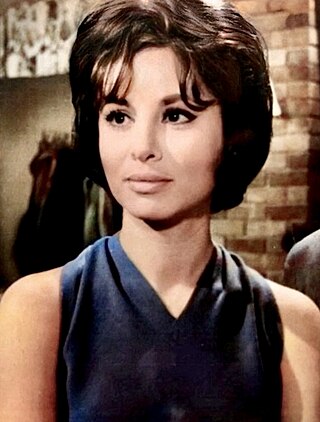
Sexual harassment is a type of harassment involving the use of explicit or implicit sexual overtones, including the unwelcome and inappropriate promises of rewards in exchange for sexual favors. Sexual harassment can be physical and/or a demand or request for sexual favors, making sexually colored remarks, showing pornography, and any other unwelcome physical, verbal, or non-verbal conduct of a sexual nature. Sexual harassment includes a range of actions from verbal transgressions to sexual abuse or assault. Harassment can occur in many different social settings such as the workplace, the home, school, or religious institutions. Harassers or victims can be of any gender.

Faten Ahmed Hamama was an Egyptian film and television actress and film producer. She was the first wife of Ezz El-Dine Zulficar. She made her screen debut in 1939, when she was only seven years old. Her earliest roles were minor, but her activity and gradual success helped to establish her as a distinguished Egyptian actress. Later revered as an icon in Egyptian cinema. In 1996, nine of the films she starred in were included in the Top hundred films in the history of Egyptian cinema by the cinema critics of Cairo International Film Festival.

Women-only passenger cars are railway or subway cars intended for women only. They are a result of sexual segregation in some societies, but also can result from attempts to reduce sexual harassment and assault such as groping.

The Egyptian film industry is today based mainly in Cairo, which is sometimes referred to as Hollywood on the Nile or Hollywood of the East, despite having its beginnings in the city of Alexandria in the early 20th century. A strong industry grew in Egypt with a high distribution rate among the Arab world, and Cairo produces around three-quarters of the Arab world's screen output. It has had a large effect on the African and Arab film industry since the early 20th century.

Crime in Egypt is moderate, but still occurs in various forms. Forms of crime include drug trafficking, money laundering, fraud, corruption, and black marketeering.
The role of women in Egypt has changed throughout history, from ancient to modern times. From the earliest preserved archaeological records, Egyptian women were considered equal to men in Egyptian society, regardless of marital status.
The Egyptian Centre for Women's Rights (ECWR) is a civil, independent, non-governmental, non-partisan, not-for-profit organization in Egypt. It supports Egyptian woman in obtaining full rights and equality with men. In addition, the ECWR motivates legislative authorities to review legislation related to women's rights, not only as it relates to the Egyptian Constitution, but international agreements as well. The ECWR consolidates both civil and political women's rights, and offers legal services to women who can not afford to pay for them. Nihad Abu El-Qoumsan heads the organization.
Lamis Elhadidy, is an Egyptian TV presenter. She also worked for Al-Masry Al-Youm newspaper.

In a sexual context, groping is the act of intentionally touching another person in a sexual manner, usually without their consent. The term generally has a negative connotation in many societies, and the activity may be considered sexual assault or otherwise unacceptable. Touching a consenting person's body during sexual activity, a massage, or a medical examination is not usually considered groping, though the term is sometimes used to include clumsy, selfish, or inappropriate sexual touching. Areas of the body most frequently groped include the buttocks, breasts, vulva, thigh, penis, and scrotum. Gropers might use their hands, but pressing any part of their body against another person can be considered groping.
Bushra Rozza, is an Egyptian actress and singer. She earned the Best Actress award at the Dubai International Film Festival for her role in 678.
Mahmoud Abdel Salam Omar is an Egyptian businessman. He is the Chairman of El-Mex Salines, an Egyptian salt production company, and was formerly Chairman of Egypt's Bank of Alexandria and head of the Egyptian Banks Federation. In May 2011, he was arrested on charges of sexually assaulting a maid in his room at New York City's Pierre Hotel.
Operation Anti Sexual Harassment, is an activist group in Cairo, Egypt, whose goal is to prevent sexual harassment and assault, and in particular the mass sexual assaults that occur during protests and religious festivals. The group is known for intervening in assaults by mobs in Cairo's Tahrir Square and is one of several that have begun to organize against sexual harassment of women in Tahrir since the 2011 Egyptian revolution.

Dina Butti is an Egyptian/Canadian TV presenter, content creator and voiceover artist. She is most known as a TV presenter on the United Arab Emirates’ English television channel, Dubai One, where she co-hosted the channel's celebrity program, That's Entertainment, reported for their Expo 2020 Dubai daily live coverage and is currently hosting their evening lifestyle show, DXB Today.
Rape in Egypt is a criminal offense with penalties ranging from 15 to 25 years and a lifetime sentence if the rape included abduction. Marital rape is legal. By 2008, the U.N. quoted Egypt's Interior Ministry's figure that 20,000 rapes take place every year, although according to the activist Engy Ghozlan (ECWR), rapes are 10 times higher than the stats given by Interior Ministry, making it 200,000 per year. Mona Eltahawy has also noted the same figure (200,000), and added that this was before the revolution.

Nelly Karim is an Egyptian actress, model, and ballerina.
Malmö Arab Film Festival (MAFF) is an Arab film festival based in Malmö, Sweden. MAFF is widely regarded as the most influential and largest Arabic film festival in Europe, and is the only one in Scandinavia. The first edition was held in 2011 and today the festival presents a broad selection of films made by Arab filmmakers or that in some way connects with questions of the Arab world or culture.
Aida El-Kashef is a feminist Egyptian filmmaker and actress. Her acting credits include Ship of Theseus and Walad w Bent. She has also directed the short films A Tin Tale and Rhapsody in Autumn.

The mass sexual assault of women in public has been documented in Egypt since 2005, when Egyptian security forces and their agents were accused of using it as a weapon against female protesters during a political demonstration in Tahrir Square, Cairo on 25 May. The behavior spread, and by 2012 sexual assault by crowds of young men was seen at protests and festivals in Egypt.
Mass sexual assault is the collective sexual assault of women, men and sometimes children, in public by groups. Typically acting under the protective cover of large gatherings, victims have reported being groped, stripped, beaten, bitten, penetrated and raped.

Mohamed Diab is an Egyptian screenwriter and director whose work often centers on pressing issues concerning Egyptian society. He is known for his directorial debut film Cairo 678(Les Femmes du bus 678), which was released a month before the Egyptian revolution, and for directing Disney's Marvel series Moon Knight.










